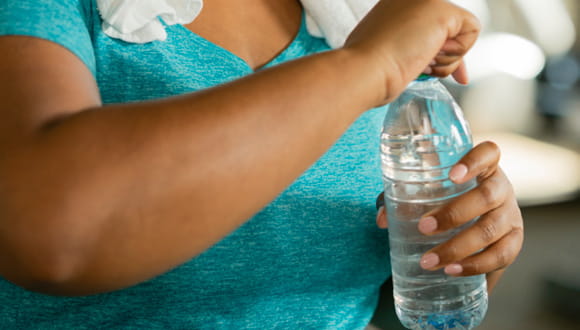4 Hydration Mistakes to Avoid Before, During and After a Marathon
Jan. 14, 2020 - Katie McCallumNo two marathon runners are exactly alike. But, there is one thing all participants will have in common when they finish their run: They'll be sweaty.
Sweating gets a bad rap, but it's actually a really helpful biological process. Your muscles generate heat as they work, and sweating is how your body gets rid of it so you don't overheat.
But, sweating means you're losing water and electrolytes, so you need to be thinking about your hydration status.
"The fluid and electrolytes you lose in sweat need to be replaced," says Amanda Beaver, wellness dietitian at Houston Methodist. "Fluid helps your heart pump blood to your hard-working muscles and helps regulate your body temperature, while electrolytes are essential for muscle contractions."
As a marathon runner, you know just how important these things are, and therefore how important it is to stay properly hydrated. Here are four hydration mistakes that are easy to make before, during and after the race — as well as tips to avoid making them.
Hydration mistake #1: You wait until the last minute to hydrate
If your plan is to wake up extra early the morning of the race just to chug a bunch of water, think again.
Hydrating for a marathon or half marathon actually requires focusing on your fluid intake well before the race ever begins. In fact, many experts recommend maintaining proper hydration for two days leading up to the race. This gives you your best chance of starting the race adequately hydrated.
The good news is that all it takes to keep tabs on your hydration level is a quick peek at the color of your pee.
"One of the best indicators of your hydration status is your urine," says Beaver. "If you look at your urine and it's pale yellow or straw-colored, it's a sign that you're adequately hydrated. But, if your urine is darker than that, it likely means you need to hydrate."
If you've been staying adequately hydrated, your pre-race hydration plan is as easy as drinking two cups of water the morning of the race (just make sure you do so about two hours before it begins).
"Overcompensating on fluids the morning of the race doesn't actually benefit you," says Beaver. "Not only will you find yourself needing to take more breaks than you probably planned, you could even increase your risk of water overload."
Hydration mistake #2: You don't have a race-day hydration plan
"Many different factors affect the amount of fluid you need while running," says Beaver. "And, every runner's fluid needs will differ."
Everyone sweats a different amount, so you may need more (or less) water than the person running next to you. Plus, fluid needs vary based on the weather. Don't assume that just because it's January you can't overheat and don't have to worry about having a hydration plan — this is a common reason people end up in the medical area.
And with marathons being virtual this year, you'll definitely need to plan to stay hydrated during your run. Since you won't be able to rely on the marathon's water stations, consider using a handheld water bottle or setting up your own water stations using a cooler strategically placed on a familiar loop.
While it's important to make sure you're sipping water or a sports drink, it's also important to be sure you're not drinking too much. Aside from the uncomfortable feeling of water sloshing in your stomach as you run, overhydrating can have serious consequences.
Hydration mistake #3: You drink too much water
During the race, sip on water — but don't overdo it, either. Overhydrating is a serious, life-threatening issue.
"It may sound hard to believe, but there is such a thing as too much water — even while running a marathon," warns Beaver. "Drinking too much fluid can lead to a life-threatening condition called hyponatremia, in which sodium levels in the blood fall too low by being diluted by excess fluid or losing excess sodium from sweat without replacing it."
Symptoms of overhydrating include weight gain during the race, nausea, confusion, vomiting and headache.
"Although this can definitely happen to men, women may be at greater risk because they usually have a smaller body size and don't sweat as much," says Beaver.
And don't fall for common overhydration myths. Here are two things Beaver wants you to know:
- Even though sports drinks contain salt, they're still mostly water. This means you can still overhydrate if you're drinking sports drinks.
- If your muscles are cramping during or after the race, don't automatically assume it means you need to chug water. Muscle cramps can be caused by a variety of factors, including muscle fatigue and electrolyte imbalance. It's no surprise that your muscles may be fatigued after running a marathon, but you can rebalance your electrolytes by replacing the sodium lost from sweating.
Hydration mistake #4: You grab that celebratory beer too soon
Completing a marathon is an exciting, emotional experience. But, before you start celebrating, refueling should be your top priority.
If you're thirsty, sip on a sports drink — but don't chug it! Again, it's important to not to overdo it. If you're tired of sports drinks at this point, drink a chocolate milk, which comes with the added benefit of kick-starting the muscle recovery process.
"The most important thing to do after the race is to refuel by eating foods that contain carbohydrates, protein and salt," explains Beaver. "Sodium is the main electrolyte lost in sweat, so salt is not always the enemy! Don't fret about choosing a salty breakfast item after finishing your run."


